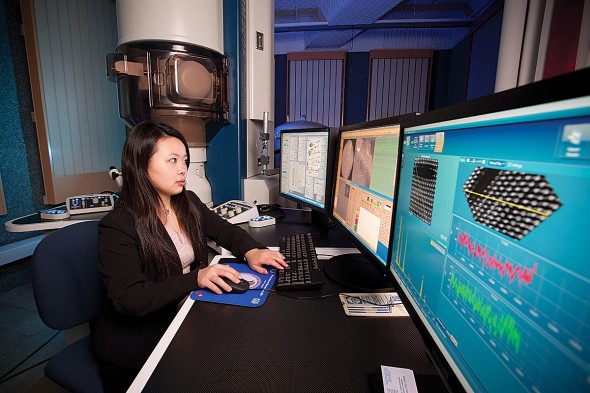Three Chicago universities form research pact

UIC’s scanning transmission electron microscope is among the facilities the campus will share with researchers from Northwestern and University of Chicago through a new agreement. Photo: Roberta Dupuis-Devlin/UIC Photo Services
As research funding from the National Institutes of Health and other federal agencies shrinks, cooperation among the University of Illinois at Chicago, Northwestern University and the University of Chicago is expanding.
With the strokes of three pens, UIC, Northwestern and the University of Chicago launched an unusual collaborative venture by forming a core research facilities partnership.
The universities’ provosts signed an agreement for “open access to research core facilities.” Simply put: there is no extra fee to use each other’s fancy instruments.
The agreement builds on an existing partnership between the three universities focused on biomedical research: the Chicago Biomedical Consortium, established in 2006 to encourage collaboration among scientists at the three institutions.
“It is creative and deep partnerships like ours that foster a real community and keep Chicago competitive as a research hub,” said Jay Walsh, vice president for research at Northwestern.
“Federal research funding has been largely stagnant for about a decade, but our three institutions are doing well, in part because of strategic alliances with each other and with other regional research affiliates. This agreement is about reducing costs and increasing the availability of state-of-the-art research facilities.”
Researchers from the three schools now have access to instrumentation and expertise at on-campus user rates, for a savings of up to 60 percent.
Faculty, postdoctoral fellows and graduate students already are taking advantage of resources located at the partner institutions.
A University of Chicago biochemist uses Northwestern’s High Throughput Analysis Laboratory to develop new cancer therapies using small molecules. A Northwestern materials scientist employs UIC’s scanning transmission electron microscope to investigate the surface structure, at atomic resolution, of certain nanocubes.
Such cooperation leads to collaboration and additional research funding, which in turn leads to more jobs for the Chicago area and the promise of research breakthroughs that could lead to clinical trials and improved health care.
“Research at core facilities opens up avenues that can lead to medical treatments and new ideas about treatments,” said Mitra Dutta, vice chancellor for research.
